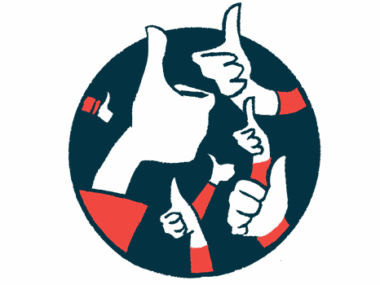Start Journaling, Write Away!
Written by |

Earlier this month, I wrote a column about mental health and therapy options available during the pandemic. Hopefully, I made a strong case for giving therapy a try if you have been hesitant.
I will always encourage people to try it out, but I also understand that many people simply aren’t into it. Especially among the rare disease community, I can see how adding one more appointment to your schedule might be tiresome.
I also know that managing a chronic illness may make you feel like a human science experiment at times. I can see why you wouldn’t want to spend any more time being observed by a medical professional than you have to. And I respect that.
So, today I want to talk about something that everyone can do to process challenges and grow during our painful days — for free, anywhere, anytime. I promise not to push therapy anymore in this column after this statement: If you feel depressed or are dealing with unprecedented anxiety, talking to a doctor can help you get on a path to effective treatment. Those conditions are treatable, so why suffer?
OK, now on to the fun stuff.
Journaling!
I have mentioned my fondness for journaling before, but there are many extra reasons why I recommend it. First of all, journaling helps us deal with uncertainty. Putting thoughts on paper in times of stress and uncertainty can help us figure out what is at the core of our suffering. Physically writing the words forces us to focus on what we’re thinking and feeling. This can shine a light on possible solutions. Or, it might force us to see that something is out of our control, which is the first step to accepting and letting that stuff go.
Writing when we are the most stressed allows our brains to detach from the chaos in a healthy manner. Imagine you are planning an extravagant meal for someone important. You need to buy 50 ingredients, and if you forget one, the whole thing will taste terrible. But you can’t go to the store for another week, so you keep repeating your list over and over so that you don’t forget an ingredient.
It’s a constant effort. You might not realize it, but you’re so worried about forgetting something that your brain is reciting the list even while you sleep. At the end of the week, you feel exhausted, and you haven’t had the time or energy to concentrate on anything else.
Sounds crazy, right? No one would do that! You would make a list of everything, throw it in your wallet and forget about it until you are at the store when it actually matters.
Our brains hold on to thoughts like this every day, and the buildup of worries and tasks is exhausting. Writing it down means that all those ingredients — worries, to-do lists, ideas — exist separately from us. If you want to think about it again, it’s as easy as opening your journal. Writing relieves your brain from the constant effort of processing and remembering things.
Much like computers, our brains run much faster and can do incredible things when they aren’t being slowed down by a bunch of open browser tabs and 10,000 songs on iTunes that you never listen to anymore.
“OK, I think this could be useful, but it feels super awkward. How do I do this? What if someone reads it?” you might ask.
First of all, set up boundaries. You don’t need to go to the Scholastic Book Fair to get a diary with a little lock on it. Tell your family members that your journal is 100% off-limits. It would be a huge breach of trust if they snuck a peek.
Once you trust that your journal is safe and private, give yourself permission to say whatever comes to mind without worrying about it being “good.” Don’t judge yourself for what comes out, and don’t worry about spelling, grammar, or even structuring it so that it makes sense.
Stream of consciousness journaling is a good way to get the words flowing. I call this a “brain dump.” All you do is sit down and verbal-vomit for 5-10 minutes without stopping to question.
If that feels uninspiring or too unstructured, there are a million free journal prompts out there to give you some direction. Search the web for “journal prompts for [insert issue/topic/demographic]” and see what comes up.
No matter how you journal — in a notebook or a Word document, or even on a napkin — it is a tangible expression of your inner world. You can always read it and reflect on how far you’ve come, or what changes you have made. Maybe you’ll also notice areas that still need work. Either way, writing about your life might just change it.
***
Note: Pulmonary Fibrosis News is strictly a news and information website about the disease. It does not provide medical advice, diagnosis, or treatment. This content is not intended to be a substitute for professional medical advice, diagnosis, or treatment. Always seek the advice of your physician or other qualified health provider with any questions you may have regarding a medical condition. Never disregard professional medical advice or delay in seeking it because of something you have read on this website. The opinions expressed in this column are not those of Pulmonary Fibrosis News or its parent company, Bionews, and are intended to spark discussion about issues pertaining to pulmonary fibrosis.







Pramod shastri
मैं 2018 नवंबर से ild ipf का रोगी हूं मैं मुझे भोजन का स्वाद बहुत बुरा लगता है मैं केवल दूध फल ही ले रहा हूं वजन 20kg कम हो गया है
?करता यह सामान्य स्थिति है
Christie Patient
Hi Pramod,
I cannot provide medical advice for you as I am simply a caregiver. If you have access to a doctor, that would be a good question for them. I know ipf can affect your appetite, but try to eat nutrient rich and fatty foods to maintain a stable weight. Hearty bone broth is a good way to get calories when it's hard to eat. I wish you the best.
Christie
Mari
Awesome post, Christie! Sharing with my peeps. Yes, Journaling For The Health Of It® is a daily life changer and improves our health (mental, emotional, physical and spiritual.) #JustWriteON! #MePower!
Christie Patient
Thanks Mari!
Rosella Virdo
Great timing! I just purchased a journal. It’s only been a few days though. I find it relaxing and helpful. Good article and suggestion.
Christie Patient
That's awesome Rosella! I hope you enjoy it and find it therapeutic.
Christie